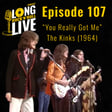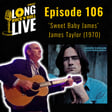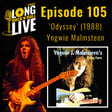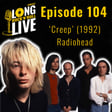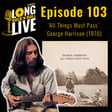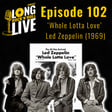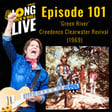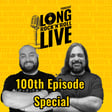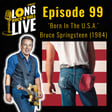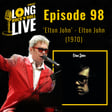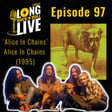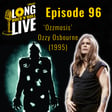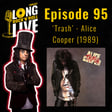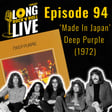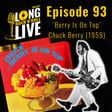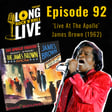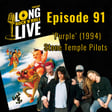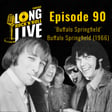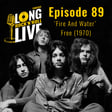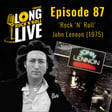Become a Creator today!Start creating today - Share your story with the world!
Start for free
00:00:00
00:00:01

88. 'Fresh Cream' - Cream (1966)
In 1966, Eric Clapton, Jack Bruce, and Ginger Baker left their previous projects to form Cream, rock’s first supergroup and a defining force in Britain’s ‘Electric Blues Rock’ movement. Their debut album, ‘Fresh Cream’, was the starting point for this power trio - revolutionising British Blues by elevating the electric guitar’s role, blending Hard Rock, Psychedelia, and Jazz and setting a high standard for Blues-inspired musicians seeking their own unique sound.
- Episode Playlist: https://open.spotify.com/playlist/2il7kkncurOgvfBXBIeBUe?si=75920ffa306e4f7b
- Follow the Podcast online: https://linktr.ee/longlivernrpod
- Get in touch and/or leave us a review: longliverocknrollpodcast@gmail.com
#Cream #EricClapton #JackBruce #GingerBaker #FreshCream #1966 #Blues #Rock #Jazz #Psychedelic
Transcript
00:00:00
Speaker
Hello and welcome back to another episode of the Long Live Rock and Roll Podcast. In 1966, Eric Clapton, Jack Bruce and Ginger Baker left their previous projects to form CREAM, rock's first supergroup and a defining force in Britain's electric blues rock movement.
00:00:17
Speaker
their debut album, Fresh Cream, was the starting point for this power trio, revolutionising British blues by elevating the electric guitar's role, blending hard rock, psychedelia and jazz, and setting a high standard for blues-inspired musicians seeking their own unique sound. Joining me to discuss this album is my co-host, Mr Felipe Amarin. How are you doing, bro? Doing great, man. How are you doing? Yeah, good. Thank you. Another good week.
00:00:41
Speaker
Yeah. Yeah. Same old life ticks on. Yeah. One of those, one of those weeks rubbing and listening to music. and all that so Perfect life. Excellent. Well, let's jump straight in. As usual, guys, you're going to get some, actually, as usual, do the T's and C's first. If you're listening on Apple, Amazon or Spotify, do us a favor, scroll down, give us five stars, write a little comment about the show, because it's going to help us be seen by more people on these podcasting platforms. And if you have nice words to say about us and give us good reviews, then we're going to go higher up the chart and be seen by more people. If you're watching and and or listening on YouTube make sure you hit like and subscribe so you stay up to date with all of our new content. um So some album details, so the album is called Fresh Cream by the band Cream released on the 9th of December 1966, recorded between August and November of the same year at the Mayfair Recording Studios in London. The genres mainly associated with it would be blues rock or psychedelic rock
00:01:38
Speaker
We can discuss that a bit further. The label it came out on was Reaction, and it was produced by Robert Stigwood. So where do we start? Cream. Well, where do we start? From the musicians, maybe. Let's do that. Do you know what? Actually, let me just do a quick British blues explosion background. yeah So for anyone who's obviously been with us for a while, episode 17 we did on Cream, and we did it as like a band episode, just an overview of their career, what albums hit which spot and why. But now, obviously, we're focusing much more on the first album.
00:02:08
Speaker
So the British blues explosion, there was a blues revival in Britain during the 1960s because we had a popularization of American blues artists ah like John Myle, Alex's Corner, even the Rolling Stones, you know, obviously putting some of the American bluesisms into their music and taking my influence because in the 50s we saw american blues musicians come over to the uk uh do you want to talk a bit about that because you remember we studied it in uni yeah exactly oh yeah so there was a uh this movement this idea of bringing the ah
00:02:43
Speaker
the early blues songwriters, singers, guitar players to the UK to perform, isn't it? Yep. And I think that was what started the blues movement in the UK. Was that it? Yeah. Do you think that was exactly when people started to play blues in the UK? I think, yeah, I think that's certainly when they were starting to hear more obviously, because, you know,
00:03:10
Speaker
It's not like nowadays where like you just send someone on WhatsApp, hey, check out this track that was released in Indonesia. You needed a live experience back in the day. Exactly. If you were not performing in town, you wouldn't know about them. No, exactly. And you know it's not like you would send over to America your vinyl and be like, hey, mate, check out track three. you know it It was much more of a, like you said, a live experience, just seeing what bands were like and what they were sounding like.
00:03:33
Speaker
um And because of this, you know, this movement provided a massive platform, especially for someone like Eric Clapton, because you have to remember, we'll talk about them in a second, but Clapton came from almost a purely blues background. yeah um And so yeah, well well let's talk about Clapton. Clapton actually saw um ah Buddy Guy live and he said they changed his life, you know, wow really it changed his approach to music.
00:03:57
Speaker
And ah so that's what that was one of the ah one of the um experiences that happened with these these blues musicians playing in the UK. Yeah. Well, Clapton was a guitarist for the Yardbirds until about 1965, where he left um because he he felt they were becoming a bit too commercial. He wanted something a bit more niche, a bit more obscure. He didn't want to just dabble in le pop music or whatever it was.
00:04:24
Speaker
um And so then from then he joined John Miles Blues Breakers. Now there is an album called ah Blues Breakers with Eric Clapton and it's actually on our list to do over the next couple of months so we will get to that one because it's a very important album. It's basically the album where British rock bands. I'm generalising here, but a British rock band took the blues that we've just been talking about from the 50s and 60s and electrified it and basically showed a new way of how to characterise blues in Britain. They just played it louder. Yeah, louder and with a much harsher guitar tone. um His guitar playing on this album earned him the nickname God.
00:05:10
Speaker
yeah in guitar circles, it god of guitar yeah which is a rather... that appropriate title because and the choir you know you'd be very proud to have that. Now on to Jack Bruce. i but Jack Bruce was a classically trained musician but he had a very strong background in jazz and I love this because you can hear it throughout his career these little jazz playings. um He was part of a jazz blues fusion group called the the Graham Bond organization which I believe Ginger Baker was also part of. Yes, he was part of, yeah. And they didn't get along that well, did they? No, they didn't. No, no good friends. Well, why don't you talk about Ginger Baker? Tell us a bit about his background. So Ginger Baker was clearly into jazz. You can hear in his drumming and he was into all the classic jazz drummers. And I'm not quite sure if he wanted to be like a traditional rock drummer. I don't think he ever wanted to.
00:06:11
Speaker
to play rock music as you know as is supposed to be played or as people were playing at the time. um His approach has a lot of percussion elements to it. So he wouldn't play like percussion instruments like just bring bongos and congas to the studio, but he would hit the drums as if he's playing that sort of stuff. And I'm sure, ah ah I read a a lot about him as well. He was seing to it was into African music as well. So he said the idea of um using using the tombs and the low drums as well as part of the grooving setup because normally a drum beat is bass drums, snare drum and hi-hat so it's one cymbal and the lowest and and the and the highest drum in the kit that's what you do for the drum beat and he was just using the whole kit
00:06:59
Speaker
ah to express himself and actually to build the grooves. And the other thing which is very jazzy about his approach is he doesn't repeat himself. Very rarely he plays two consecutive bars of the same thing. When you think about pop music and you think about early rock music and even blues, the drummer is normally told to stick to one beat. So you play the same groove throughout the whole song. keep with the occasional phrase of fill at the end of 12 bars or something like that to like a signpost the next section of the song but you stick to the beat and he wasn't like that he refused to be like that so in jazz music especially more than jazz I would say it's it's very common it's not a surprise that a drummer wouldn't play the same beat all the time it's yeah a lot of improvisation but in rock music I don't think anyone has done to that extent up to that point in time
00:07:49
Speaker
You mean, yeah, bringing the jazz. Yeah, not I can completely agree. Playing drums like that never sticking to one beat yeah and always doing something different than everybody. I think i think ah you you have John Bonham, Ginger Baker and Keith Moon as the the three drummers for me who actually ah um changed the role of a drummer in the rock band. jason I want to talk about John Bonham a bit later. I think you know where I'm going to talk to you about. So there are the three musicians who formed Kreen. So what we're trying to get at with this with this little intro is that all three of these musicians were as good as, I don't know, is Virtuoso too much of a word? They were pretty damn good. not Not too much of a word. That's a good word. Yeah. That's a great word. Actually, there's ah a Rolling Stone magazine. I want to get the the exact quote. there's ah There's an article about them, ah which they basically say... Hold on, wait, wait, wait. What year was the article?
00:08:42
Speaker
oh that's I think that's recent. i'll get answer yeah it's not as' not it's not one of the It's not a late one. yeah um Crucially, they were the first rock band to feature a virtuoso player on every instrument.
00:08:56
Speaker
So that is, I think that I agree with that statement because. So if Roland Stone say it, then I'm happy for us to agree with it. Well, yeah, yeah. So you have these. Yeah. yeah and Yeah. I think I think all the rock critics were talking about the musicians rather than the band, isn't it? Yeah. And so because of this, in mid 1966, Ginger Baker decided that he wanted to form a new band. Now he approached Clapton. um Obviously, as we said, all of these musicians were highly regarded at the time, but Clapton had a little um well let's say a term and condition he was basically like i want to join this band but only if we get jack bruce in now jack bruce had already had conflicts with ginger baker hadn't he in the lead up to forming cream yeah they were not good friends and the thing i think i don't know if it was like musical differences or they just didn't like each other and i think ginger baker didn't want jack and bruce in the band but clapton said i want him as a bassist and i won't do it without him so that was it
00:09:53
Speaker
I think it's just fascinating. John, let me just finish. My last note is the band's name Cream came from the idea that they were the Cream of the Crop. They were the three best musicians out there, the Cream of the Crop, so to speak, and we're going to make a band based on that. Wicked. So that's the background of the context of the band done. Next, we'll move on and talk a bit about the music. But I just want to say first how crazy it is.
00:10:17
Speaker
to to to To execute music properly, as you and I know, and as we know from our heroes and the bands we love, there has to be some form of understanding companionship com camaraderie to execute an album and the music to a fantastic extent but however throughout history we've seen moments like rumors by Fleetwood Mac where people were not getting on and every now and then you have these moments of stardust
00:10:48
Speaker
where people did not like each other, band members did not get on, yet somehow something fantastic comes out from it. Rumours was a one-off, wasn't it? But for a band like Cream to have done three of arguably the most important albums in rock, all whilst Ginger and Jack were hating each other. You've got to commend them. for years right Yeah, you've got to commend them. Because I look at them and I think, well,
00:11:16
Speaker
I'm sorry that that was probably the most three most miserable years of your lives, but thank you for what you gave us from it. you know yeah but I recommend a documentary, I think it's called Beware of um Mr Baker.
00:11:31
Speaker
So you recommended that when we did the cream episode. So I'll put that again in the show notes. You're going to see what kind of character Ginger Baker was. Not the easiest person to deal with, I guess. No, I'm so sure. but Let's talk about the music. So I just want to talk about where the sort of the the fantastic blending of genres we have here. And we often say this about albums that were pioneering, that were innovative, how they mix things. But what I love here, especially with this album, is how every song near enough is rooted in the blues. But they just take a certain little aspect and they roll with that and it pushes it towards this. Or they make this a little bit more psychedelic and it pushes it towards psychedelia. They'll use some heavy you know some heavy guitar tone and some heavy drumming and that'll push it towards hard rock. And I just love how they have this this unique sound, but each song has a little different aspect added in that takes it almost entirely into a new genre.
00:12:28
Speaker
Yeah, I think um um half of the album is traditional blues is someone else's music. Yeah. but They don't play anything in a traditional way. And I think that was the point. you know Great point. yeah Yeah. So I just want to talk a little bit about what was going on at the time musically and how, from my interpretation, ah Cream looked at and adapted this so let's look at pop music okay the Beatles were pushing the boundaries in terms of pop music they were using technological advancements their songwriting was um you know really sort of flourishing especially with all four members writing bigger emphasis on the album you know a collection a cohesive collection of songs as opposed to just a bunch of singles
00:13:12
Speaker
um And the songs I hear on Fresh Cream, I hear I Feel Free, Dreaming, and Four Until Late. These really exude a kind of pop sensibility to me. yeah They're easy to listen to, nice chords, accessible melodies. You know, Dreaming, I think, is lovely. One of my favorite songs on the album. That's a falsetto vocal in that song. It's so beautiful. It is. it's And it's lovely, the chords are just simple, it sounds like a doo-wop song from the 50s, you know. It's psychedelic though, isn't it? A little, yeah, exactly, yeah. 4 until 8 reminds me of When I'm 64 by The Beatles. So similar, like just a really nice pop sensibility to it. um
00:13:52
Speaker
and in terms of the blues sound which we've really touched on, I'm sure you'll touch on the blues a lot later because you are the blues man, in the UK at the time you had the Rolling Stones which I said right at the top of the show pioneering the American blues sound and you've got the obvious songs here, Spoonful, Rolling and Tumbling, just a very obvious blues rooted sound. Now in terms of hard rock at this time you had the Kinks who essentially ah Arguably the first ever heavy metal riff came from, um I always bloody forget it. I want to say all day and all the night, but it's not. What won the Van Halen cover? The Van Halen song. Yeah, the the but of the Kinks.
00:14:32
Speaker
Oh, you really got me, isn't it? Bro, i I looked for that song only last week when we did the Jimi Hendrix album. I do remember i I keep forgetting that Kinks song. It's not that famous, is it? They're one of my favorite bands. They're one of my favorite bands. I should be ashamed. ah Yeah, You Really Got Me was arguably the first ever heavy metal riff because it just had that pure distortion. So you had the Kinks and the Who.
00:14:57
Speaker
embracing heavier sounds, laying the foundations for hard rock and even heavy metal. I listen to this album and I hear in songs NSU, Sweet Wine and Cat Squirrel. I hear the early dawn of hard rock, that dirty heavy guitar sound that Zeppelin would come on and do, that Deep Purple would go and do, that would then transform into heavy metal. I hear it in those songs. And finally, in terms of the psychedelic elements,
00:15:25
Speaker
Psychedelia, as we talked about with Hendrix and Purple Haze, it was gaming traction in London, the hippie counterculture that was sort of swarming around, you know, the the younger generations of the 60s and 70s.
00:15:38
Speaker
You had Pink Floyd doing their stuff as well, you know, just a year after this. And I listened to Sleepy Time Time. I'm so glad. I feel free and dreaming. And I hear the psychedelic elements there. And I hear what you heard Hendrix do ah or what Hendrix did the year after and what Pink Floyd would be doing. You can hear the direction it's moved in.
00:15:59
Speaker
So I just wanted to sort of touch on those four little genres, if you like, and just identify what I hear from fresh cream in them. And it's just brilliant, as I said at the start, how they've managed to incorporate these and take tiny little elements. But don't get me wrong, bro, there are overlaps here. um What did I say? You know, I feel free. I've got in pop and psychedelic.
00:16:19
Speaker
yeah It doesn't have to be one or the other, but I just hear little elements in it. What what do you think about what I've said about pop blues? i i' say that that kiss Some of the songs are even short, really. They have some long like there's some like really long solos and long songs, but they have some two and a half minute tracks ah with with the emphasis on the vocals. That's pop music. you know That's the formula of pop music. It's more about the vocals than anything else.
00:16:43
Speaker
I think everyone was expecting them to be a a a band of soloists as the main thing, which to a certain extent they they were, but I think there's a lot of um um a lot of melody, a lot of like vocal harmonies. there's this I think the intention was also sure to write good material. Although ah there's an interesting um a quote from Jack Bruce, which I found really interesting. He said, the songs are unimportant. They are jumping off points for improvisation.
00:17:16
Speaker
So his take on it, it's really weird, he said that in a certain way. That is weird, yeah. Because because he just wanted to, but basically I think he he just wanted to improvise. He came from like a formal ah music music background but he didn't like it. He said the the thing with music education is people tell you how to do things in a certain way and they not do not allow the individual to to um to experiment and to to express themselves. So I said it didn't feel like an individual and was having music lessons and he wrote like a string quartet and the teacher was like, oh, this is wrong. This doesn't work. You'll never be a writer. That's not for you. You should play the cello and just be an instrumentalist and play someone else's stuff. That's what is being told by a music teacher.
00:18:00
Speaker
you know i don't I don't care, I'm going to do my own thing. So I think in his mind, he was just writing whatever, like any riffs or any basic idea. He also said like the idea was to have the this the start and the end of a song and do whatever in the middle, just improvise the whole middle section of of it, which I think is it's the case when they play in the blues. I think, I don't know if you can if you can tell this difference. When they're playing someone else's material, I think it's basically what he said. The the song is not that important. it's just
00:18:31
Speaker
It's just a converse for them to to to to create their own stuff. yeah But their own stuff is very melodic. i think i think his I think Jack Bruce wasn't fair to himself as a songwriter. And everyone talks a lot about Clapton and and Ginger Baker, but Jack Bruce was the lead singer. Clapton only sings in one song from Not Roman, the whole album. but yeah and And he was the main songwriter in the band.
00:18:55
Speaker
Phenomenal musician. I think so underrated, really. Sometimes we talk about some of the greatest songwriters and singers in rock history. We don't remember him sometimes, you know. I've got them. Yes. So Jack Bruce basically wrote every song. Sweet Wine. Sweet Wine was written by Ginger Baker and Jack Bruce's wife. But all the original stuff, except Toads as well. I think it was Jack Bruce, wasn't it? It wasn't Sweet Wine. I've got Sweet Wine being Ginger Baker and Jack Bruce's wife, Janet Gottfried. Have you got something different? No, no, I thought I thought it was Jack Bruce. Okay. Yeah. But this is a pattern throughout. And as the albums go on, you have a little bit more influence from Clapton and writing from Clapton and Ginger Baker. But for debut album, man. And it's really interesting you say that, because in a way I disagree. What I hear when I went, what Jack Bruce has said, I hear it in those blues songs. Yeah. But the songs still feel
00:19:51
Speaker
organized. They feel cohesive and well written. They don't feel improvisational. And what I mean by that is
00:20:01
Speaker
I don't know, let's compare it to something like... Well, you have like vocal harmonies, for instance, that has to be planned. and Yeah. And you have an intro with just vocals and then there's a stop, then there's a bass riff. It is a composition, right? But I think i think what um the way I see it, it's like it's it's clear for me that their material was something they really ah spend a lot of time arranging. And the blues stuff, they say, we're just going to do it. We're just going to improvise on top of this. In that sense, that's fine. I think I can see two there's two sides in the album in a certain way. Yeah, and you're absolutely right with that. Yeah. um Now, something that was extremely important to this about this band and especially this album was a new kind of band that was pioneered by Cream, the power trio.
00:20:52
Speaker
Yeah. Tell us a bit about the poetry. Well, poetry is like you you can think of Russia, you can think of the police, you can think of Hendrix, Hendrix experience. You know, there's so many like poetry, is but I think Cream was the band that um showed to the world that this could be done and it could be done without any additional musicians. It's a really interesting point about, well, I know we're going to talk about the production, but there's no additional musicians in the album and there's not too much over them. They try to play most of it live.
00:21:26
Speaker
uh due to budget restrictions as well but because i think they they said we can do so if you're calling yourself the cream right if you if if they calling themselves the best band in town they're not being really humble about this it's like we're the best band in town so you can't use too much um you know, of extra people or resources that they're going to kind of ah disguise your sound. You need to deliver the sound as a three piece band that I think they wanted to prove the point. It's almost the opposite of Steely Dan. Steely Dan never said, Steely Dan never said we were the best, but they they just wanted to make their music as good as they could. So they bought in shitload of musicians, whereas Cream, that's a great point you make where they must have been like,
00:22:11
Speaker
we've identified ourselves as the cream of the crop so we're going to do everything on this album and I think that's a fair point. um So yeah the power trio I mean what a way I mean you and me have played in a power trio with Jack and it was brilliant I love it I think it's such a great format because never have I felt so connected to the music when I play in a power trio because I think sometimes if you add a keyboard player it can almost its the clashes yeah
00:22:43
Speaker
When you play for the power trio, you're going for that raw energy and it suits rock music a lot. You know, as we've seen, Nirvana, Hendrix, Rush, Cream. When you add a keyboard, it almost, I'm going to use the word overproduced because a keyboard can have ah a plethora of sounds on it that can give you any sound you want. If you want an organ, you've got it. If you want a piano, you've got it. If you want some synth, you've got it.
00:23:07
Speaker
And for that reason, because the keyboard is such an advanced instrument, I think it detracts from it being a raw rock band. In the same way, adding a rhythm guitarist means you're taking away one of the jobs of the bass and you're also taking away one of the jobs of the guitar. And we quoted last week we commented last week on how, or two weeks ago, how seamlessly Hendrix was able to switch between rhythm and lead guitar. And that really showed his expertise in the instrument.
00:23:36
Speaker
So when I hear a power trio, and when we played in the power trio, I made sure that my job as the bass player was to give the guitar all the support it needed. And if that meant playing a chord on the bass, if that meant playing a note that wasn't the root note because I wanted to harmonize what the guitar was doing in the root, then I do that.
00:23:58
Speaker
I just, I love the Pacio format. It's just amazing. If you're playing with a like 10 piece band, with like percussion, two keyboards and backing vocalists and all that stuff, less is more. Because there's a lot of layers, there's a lot of people doing something, one detail. So sometimes, if there's two guitar players in the band,
00:24:18
Speaker
They don't have to play all the time. so so You want one of the guitar players to not play for a couple of bars and just play a short phrase on top of the rhythm. But when you have only three musicians, you need to fill all the gaps. And there's a danger of doing of doing too much of that and overplaying.
00:24:37
Speaker
which I think Cream does a little bit of overplay, but intentional overplay. Jack Bruce's bass lines are not, they're not simple, they're really busy, but they're very melodic. I think his classical music background might have helped with that. I don't know. this it' it's I find as a drummer, I find quite annoying when a bassist doesn't stick to the bassline and just plays a million different things because it's a moving target to congruent with the guy. But great point there's a yeah, there's there's only, a I think there's only a couple of bassists that I can think of that actually do that really well. Jack Bruce, John Entwistle and Chris Quire are the first names that come to my mind. Maybe John Paul Jones, if you consider him as a guy who plays a lot of notes, but he doesn't do that all the time.
00:25:24
Speaker
good point yeah yeah and all of them are right and um you know yeah jack bruce's playing was incredibly melodic and intricate um I go as far as saying sometimes he it was almost like the bass was a second lead instrument at some time, and especially if Clapton was doing anything, and I'm not talking just about this. Lead bass. Yeah, yeah. But if Clapton was doing anything rhythmic, that kind of gives jackfruit. But that that's the position of the bass in a power trio. If the guitar has to do something rhythmic, like hold a chord or do a rhythm just with chords, yeah the bass then has the freedom. Actually, I don't want to use that phrase. I was going to say the bass has the freedom.
00:26:01
Speaker
I don't think it's about freedom. I don't think it's about Jack Bruce going, OK, my time to shine. I think it's Jack Bruce going, OK, the guitar is holding down the rhythm here. Why? What's the point of having a guitar, a bass and a drummer all doing rhythmic? I'm going to go and take the lead now. And whether it's in the form of a high end bass melody or a little bass line that just counteracts whatever the guitars doing, I think that's Jack Bruce's responsibility to do that. And I appreciate from a drummer how it might get annoying sometimes but I think nine times out of ten he nails it. That's what I'm saying like ah there's ah there's a handful of bassists that can actually do that properly and I think he got it right throughout the whole album. I think he is my favorite of the three of them in this album specifically. I think he's the guy who holds it together and ah of course he who wrote the songs as well. yeah
00:26:55
Speaker
So just to finish off on the music, let's talk a bit about each each member. So, um Captain, we know obviously what he did from the Blues in the years before, but I think what's really impressive in this album is hear him go from his strict traditional blues to playing with hard rock riffs, experimental sounds, psychedelia. it I think it was quite fresh to hear that, fresh cream. Yeah, yeah fresh cream. Well, the thing is, we normally call rock music ah when you're mixing a lot of stuff, right? and When you mix and anything that became before rock, we just call it rock. because Yeah, exactly. so that would be ah
00:27:33
Speaker
Clapton's first rock album, right? Because he was changing the way the blues was played, but he was still playing blues and he was still ah kind of stuck in that formula and in the structure of the blues, although his guitar playing was uh um completely different than everyone else at the time his guitar tone was unique but he was still playing blues music and this album he was just doing something else and we know him as a singer and songwriter as well but he's not singing much in that band so basically he he had all that time to focus on the guitar playing so that was before he he became an actual band leader or solo artist so he's he's and he's no longer serving the blues um
00:28:19
Speaker
how can I put it, the blues community or the blues movement. He was playing with the blues breakers. like There's a lot of restriction there. You're not really an active member of the band, you're just playing guitar. He was you know getting paid to go there and and be the best guitar player he could be, but I don't think he was in charge of any creative decisions. That's a great point. He could he yeah do a lot more.
00:28:39
Speaker
That's a great point because ah you know more than anyone about the Blues community and i've I've got so much respect. I love the Blues community, especially in London you know where you play at the Blues Bar however many times a week and I've played there a few times with you.
00:28:53
Speaker
The blues community there is fantastic. they just and I don't think I've ever seen such a passionate group of people who just love one aspect of music. I'm not saying everyone there only likes blues, but when they all come together at the blues bar, it's just let's talk blues. However, there is a slight element, and I'm going to let you take this because you're part of the community. So if we get any shit for this, you can have it. However, I would just say there is a slight
00:29:20
Speaker
gate keeping aspect where personally from my experience I've seen and heard people say that's not you can't do that that's not like traditional blues a traditional blues player wouldn't have used a fuzz pedal or something like that and And so I'm going to ask you, do you agree? But then my my question, but my point afterwards that it's great to see Eric Clapton, if you do agree with my point, break out of that little community to go and start something completely new. Honestly, um I joke that I work for the Blues Police, right?
00:29:54
Speaker
lose police is everywhere. So if I'm wearing trainers and someone spots me with trainers, that's it. That's the end of my career. and the police scene You know, got to wear shoes, proper shoes. And no, and yeah, but there's there's that this I think I actually kind of admire the fact that some people want to keep the traditional life doing things in a certain way. That's also important.
00:30:17
Speaker
Well, it's arguably the most important foundation of Western music. yeah we movie blues you know yeah if If we can't go to a place and see traditional blues played as close as possible to its original form, then we're we're killing a certain but a really important tradition. yeah good point however However, it's always important to bring innovations to music. But if you go into your live music venue that and and if you want to see a certain genre played as close as possible to to the original, that's great. But also, if you're writing music like like Cream was doing, if you want to release an album, and if you want to contribute to music as a whole, not to one genre, then you have to to set yourself free and and do whatever comes to your mind, which I think is is
00:31:03
Speaker
it's unfortunately Unfortunately, missing in in most, not all of it, but most of modern music. You don't see too many people breaking away from formulas. Everyone is afraid of trying stuff. Oh, it's not going to sell. And there's a, I think it was the same interview I watched with Jack Bruce. He says like, we didn't try just to to do, oh, we need to do the song under two and a half minutes. And it needs to have a appealing vocal for an 11 year old girl from Seattle.
00:31:33
Speaker
So no, it's like we don't care about who's going to listen to, like we're doing what we want to do. yeah do you knowve We've said this many times in the show, I think that ah very often the best kind of music comes out of that attitude. For sure, for sure.
00:31:49
Speaker
OK, so you've touched on Bruce and Clapton. Do you want to tell us a bit about Ginger Baker's drumming on this album? I think you already touched a bit on like on the use of drums, but his playing style. One thing that stood out to me is how jazzy it was. yeah really It's like Billboard in Black Sabbath, isn't it? You really bought the jazz chops from jazz into this new psychedelic hard rock kind of thing. Yeah, when you listen to the album, I would say like comparing him to to Keith Moon and John Bonham, I think it doesn't sound as loud as them.
00:32:15
Speaker
He's more about the phrasing. And does a there's a certain finesse for someone who's playing heavy rock. It's heavy, but there's more ah there's more nuances. There's more like ah quiet notes and loud notes. So he would alternate between loud and quiet in the same phrase. So he goes up and down, goes in waves. it's not it's not ah So that is certainly from from from jazz. Also the freedom of not sticking to the groove, as I said.
00:32:44
Speaker
and um and the spaces between the phrases as well. So it's not, ah by all means, his is he's never predictable. That's the thing about Ginger Baker. and another thing Another element that I didn't mention is the use of cymbals. I can hear like the the right cymbal sometimes louder than the bass and the snare in some grooves, which is what jazz drummers do. In rock music, the snare is much louder than the cymbal when you're playing a groove.
00:33:13
Speaker
and he keeps the cymbal as the main element for some of the groove. So it's's it's almost like he's almost not heavy enough for a rock band and it's just perfect for that sound. But that's what made up that's what makes this album the the wonderful blend of genres that it is, isn't it? You've got Clapton on this really distorted heavy sounding guitar but ah Ginger Baker sort of resting back, isn't it? you know yeah Yeah, and the last thing and last thing I would say about him, if you wonder if you listen to the last song on the album, that's his drum solo, right? So there's just a little riff which is the formula that Led Zeppelin copied for Moby Dick. Pause a second just to tell the listeners that anyone every song we've mentioned is in a Spotify playlist that you're going to find in the show notes. Click the link and you're going to find every song on this album
00:34:01
Speaker
For this ah for this episode, I've also included the original song for all the covers they've done on the album. So you've got the full album, the originals of the covers they've done, and then any other song that we've mentioned, like You Really Got Me, Moby Dick will be there as well. So you can listen along whenever we mention a song, you can have a little listen and see what we're talking about. Felipe, please carry on. Yeah. So if you listen to to to his song on the album, miss it's um
00:34:25
Speaker
It's interesting because he doesn't give it all on the first few bars. He starts with a rhythm and he builds up. He's playing a rhythm, he gets you into the rhythm and he's playing on the tombs as I said, the lower drums, the bigger drums.
00:34:39
Speaker
and is his play on like a melody so it sounds like ah is is is a percussive approach to drums. And then at the end, he plays extremely fast. At the end is when he's like, okay, I'm going to show what ah what I can do. And I like that sort of soloing because it's not, it's not, ah there's a story, you know, he tells a story with the solos. So I think a lot of people were expecting them to be even more ah um can i put a ah to express their ability to to play the instruments even more to be more virtuous than then they actually are in the album. I think like the first single was a surprise because the the people who liked them before they formed the band were were expecting them to to um
00:35:29
Speaker
to something musically impressive. And I think Ginger Baker is kind of on the edge of overplaying all the time, but there's some really tasty grooves that don't don't sound too loud and don't overpower the the rest of the band. I think I'd attribute what you just said to the whole band. I think they're all on the edge of overplaying. And I can't think of a song where I'd say, yeah, they've overplayed there.
00:35:57
Speaker
it's it's It's always perfect. I don't want to say yeah that the thing for me is I wish I liked cream more than I do. and But that's not an insult. I think they're fantastic. but Excuse me, I've got something in my throat.
00:36:11
Speaker
um I think the quality of their music, the quality of their musicianship, what they've done for rock music, they deserve to be in my top 10 bands, but they they just haven't quite, and it's a personal thing, i don't that there's nothing they've done wrong. Certain songs are just unbelievable. you know I definitely wanna do their other two albums in later episodes, but i think when I think of White Room, Sunshine of Your Love, Badge, Politician, they're all just incredible. And I love the journey that this album has taken us on the starting blocks to establish this psychedelic hard rock blues rooted music that they then went and expanded. um there But yeah, i mean that's I think that's all to say really about the music. The only other thing I wanted to mention is how important this was at this time, bringing blues to a younger audience.
00:37:00
Speaker
Interesting. Because think about it, you've got, you know, the Beatles doing their pop thing, all the bands I mentioned, you know, the Who and the Kinks sort of pushing hard rock a little more. You've got these new audiences that were rebelling against the system and not wanting to listen to what their parents were listening to. Suddenly you've got Cream coming in with like a six and a half minute song with loads of blues guitar solos. Yeah. i' So it was a really, it's not like one of the most important points this album, but just acknowledging that a younger audience were introduced to blues through this.
00:37:27
Speaker
Blues and jazz, maybe. Great point. Do you want to talk a bit about the production? Well, um what I said before is the fact that they don't have additional musicians and they did access everything in four-track machines. So it's all recorded with ah four tracks, which is, which is you know,
00:37:49
Speaker
it it does limit your capacity to overdub or makes it a lot harder to do actually. So you've got to rely on the performance. Yeah, yeah exactly. so that is it's not So the production is not about making them sound bigger than they are. That's that's one thing with production in general, you can get like a ah a kind of a weak guitar sound and make it sound bigger. I think they capture a lot of the sound of the room and I think a lot of the the performance. Again, it was a budget thing. I think they didn't have too much money to record this specific album yeah and ah probably they
00:38:25
Speaker
they had to do it and in limited time. So I think yeah, i so when you when you record like that, when you don't have time and money to do loads of overdubs, you only do the ones that are really meaningful to the song. So you keep that feel of a power trio and then you just add the small elements that are going to make it sound better. So I like the harmonicas, I like the um yeah i like the way the backing vocals are mixed as well so there's a lot of for me there's a lot of room sound a lot of a reverb and natural reverb in the record i might be wrong it might be a artificial i think you're right and i think there's a perfect balance is what you've said
00:39:06
Speaker
They've they captured that live energy and live sound perfectly, they've got fantastic tones on each of the instruments, yet they have not ignored modern technology, or you know what I mean, modern technology for the time. The reverb, the delay, all enhances and adds to the psychedelic, spacey, modern feel for 1966, but still the raw energy of the power trio is there and it keeps it keeps the It keeps the initial idea and sound of the music at the root, just like the blues is at the root, but takes in from different modern advancements and flourishes. It's just brilliant. My favorite part about the production is how, and this this again comes down to it being a power trio, how loud or how prominent the rhythm section is. yeah There are songs where Clapton's, I think it's the first song, is it, ah let me just double check. I think it's I Feel Free.
00:40:07
Speaker
where when it kicks in, the you could argue the bass is louder than the guitar. The bass is in your face for the whole album more than the guitar for sure. yeah um But other than that, I think that's all I've got for my notes. yeah live and you know it's just brilliant the The highlighting of each instrument, the the guitar, the bass, the drums, the production done on them for 1966 is amazing. Each instrument is so beautifully clear. And when you get those solo moments, the instruments just shine perfectly, didn't they? Yeah, they do. Excellent. and All right. Well, let's wrap it up then. Let's talk about the legacy of the album. I mean, I think we've actually touched on all these points already in the episode, but just to sort of recap them, you've got establishing the power trio, which is just
00:40:51
Speaker
you know each member playing an equally important role. Because as we've said, in rock meat rock bands with a vocalist and two guitarists, sorry drummer and bass player, you're going down the pecking order. yeah Shut up, play those root notes, play the beat, let everyone else shine, but in a power trio it kind of excels more.
00:41:07
Speaker
And you've influenced Hendrix, Rush, The Police, Nirvana, countless power trios, you know. Yeah, having the bassist as the the band leader as well is an interesting thing. So on so on stage and on on the record, I think Jack Bruce is the leader, is is the the main vocalist yeah and the main songwriter. So it's an interesting thing to have the bassist as the boss.
00:41:27
Speaker
As we already said, bridging the gap between rock and blues, you know, the Beatles and Stones really did their part so that the Stones were sort of far more bluesy than rocky when they saw 70, let's call them 80% blues. Whereas the Beatles were the opposite. They were kind of 80% pop with a little bit of the blues influence coming in in the early, in the early days.
00:41:45
Speaker
um and but Cream almost sit perfectly in the middle don't they it's like 50% blues and then we're gonna this song it'll be 50% psychedelic or this song it'll be 50% hard rock and they're just sort of that's how they went on with it really I think um pushing blues into a heavier rockier more experimental territory which as a metal fan for me hugely important you know we'll get to it when it comes up but sunshine of your love is arguably one of the first one also one of the first heavy metal riffs if you like because that did do do do do do obviously it's sticking to the blues pentatonic scale but the the tone of the guitar and the bass that little um the flat five note that do do do do that really kind of sort of emphasizes the dissonance that heavy metal is known for
00:42:31
Speaker
um The psychedelic influence of merging blues and psychedelia featured later, you know, and obviously went on to influence bands like Jefferson Airplane, The Doors, Pink Floyd. um And then my final point for this is how much it did for rock. Because at this point, when you think of rock, you think in 1966, I suppose you are still thinking of Beatles, Kinks, Who, Rolling Stones. Yeah.
00:42:55
Speaker
None of those bands, I actually think all of those bands, apart from maybe the songwriting of the Beatles, I don't think any critical musician looked at those bands and thought, now that is art. Do you know what I mean? I i look at Rubber Soul. In terms of history, right? You can compare music to every single art. for Yeah, and i I look at Rubber Soul and I think that is a piece of art because they finally, they turned what was previously a bunch of singles into a cohesive album.
00:43:25
Speaker
But in terms of having virtuoso musicians on a band, in a band, and someone looking and saying now this is a piece of art, because you have three virtuosistic musicians all coming together and putting what they're best at into songs. this sounds I feel like this sounds like I'm saying Cream are better and more important than those other bands. But do you see what I'm saying? But all those bands you've mentioned, they're not famous by people's ability to play the instrument. I'm not saying that they didn't play that well. The thing is, ah they were focused on delivering
00:44:01
Speaker
ah um popular like singles and great albums so it's like the the year the focus is on the music yeah on the songwriting or the deliver of that with cream it's almost like the focus is on the musicians which which is an important shift because it allowed rock music to to to become much more. So when you can do an album based on on someone's ability to play the instrument, so why not? Why not do that? it's not it's not It might not be your favorite kind of art but
00:44:34
Speaker
When you have someone with that sort of ability, why should they just play the basics? Why should they do what everyone else was doing? So I think part of the legacy of this album is the freedom that rock musicians would have after this. Thinking like, well, you know, I can do all these fancy things on guitar, so why not use that in a song? Yeah. you know, not only on a live performance as well, that's the other things that they were bringing to studio elements that you would normally see in a music club in London, you would go out and go to a gig and see a band improvising, but then you buy a record, is it two and a half minutes single or, and it's like, so where is all that, you know, a musical ability? Where is it? It used to belong to the music clubs and then it became part of
00:45:21
Speaker
records since this album ah so with cream you're saying what you see is what you get exactly what you see live is what you get on the again on the album which is really difficult to do really that's a great point yeah ah okay yeah cool all right well let's wrap up man do you have anything else to say One last comment from from me is like ah Eric Clapton is one of my favorite songwriters and I think I love his vocals. I had the chance to see him live in a private like charity gig and was one of the best experiences of my life. He still got it like the vocals, the guitar is phenomenal and
00:45:56
Speaker
with Cream, he wasn't there yet as a singer and as a songwriter. He was trying to find his voice, trying to find his place in music. He was just a guitar player, just a guitar player, right? He was just god the god of guitar, but he was like basically there to play the guitar. And I think the the the time he had with them kind of expanded his music vocabulary to get away from traditional blues and being capable of doing everything he did for rock and pop music up to this day. So I think, yeah, so part of that album's legacy is Eric Clapton's solo career. I think the musician he became... That's a great point. After recording this album is is is what allowed him to do what he does up to this day. You wonder how his career would have gone had he just stuck to the blues
00:46:46
Speaker
And I know for me, think about how many times... Could have disappeared. Or just not become important enough because he only stuck to one style of music. And I know we can say this with literally every other band or what happened if Jimmy Page never hired John Paul Jones, what would happen if this? But I like it more here because Clapton was on a route and I feel like Ginger Baker took him off that route, stuck him on another route, you know what I mean?
00:47:13
Speaker
yeah But yeah, anyway, cool. All right, well, let's wrap it up there. um I've got my monologue for the album, so I'll finish with that. um But before we finish, we're going to do terms and conditions again, please, if you'd if you'd oblige us. um If you're listening on Apple, Spotify, Amazon, please do us a massive favour. scroll down, rate the rate the show five stars, write us a little review. It takes 20 seconds of your time, that means the world of us, because we'll be seen by more people on the podcast apps. If you're watching on YouTube, please hit like and subscribe and share it with your friends who you think might enjoy it, so that you can stay up to date with new content.
00:47:46
Speaker
And if you're listening or watching this 300 years from now, you just like, share, whatever you do with your social media or whatever i think internet you have. Yeah, there'll be a chip in the brain by then. you So if you' listening to this three hundred if you're listening to this years from now, engage your mind chip and give us a review on all platforms. So thank you. So our grandchildren can get some money out of this. Yeah. Cool. Right.
00:48:16
Speaker
Amidst the flourishing British blues revival, three virtuoso musicians came together to form one of the world's first supergroups, Cream. Their debut album probably doesn't sit as highly amongst fans and critics the way that their following albums would, but it arguably played as ah as bit as big of a role in rock music, evolution and progression.
00:48:36
Speaker
Fresh Cream wasn't just a collection of songs and singles, it was a cohesive album that blended traditional blues with rock, jazz and psychedelic music, all executed through the raw energy of a pioneering power trio.
00:48:49
Speaker
Musically, Fresh Cream bridged worlds. The album was deeply rooted in blues, with tracks like Spoonful and Rollin' and Tumbling honouring their origins. But Cream amplified amplified and electrified the genre, injecting it with aggression and experimentation. Songs like NSU and Sweet Wine laid the groundwork for Hard Rock, while i'll fit I Feel Free and Sleepy Timetime explored the psychedelic sounds sweeping London.
00:49:15
Speaker
This blend of influences helped bring the blues to younger audiences while pioneering the power trio format, a lineup that inspired everyone from Hendrix to Rush to Nirvana. The production of Fresh Cream was equally innovative, striking a perfect balance between raw live energy and studio polish. The album captured the immediacy of their performances with minimal overdubs.
00:49:36
Speaker
The legacy of Fresh Cream is monumental if slightly understated. It established the power trio as a dominant rock format, elevated the role of virtuoso musicianship in popular music and set the stage for both hard rock and psychedelia to thrive. Cream bridged the gap between the raw energy of blues and the expanding possibilities of rock, inspiring countless bands like Jefferson Airplane, The Doors, Led Zeppelin and beyond. In doing so, Fresh Cream didn't just launch a band, it helped shape the future of rock.
00:50:08
Speaker
Yeah. That's my only comment. Yeah. Hell yeah. Excellent. Right. Well, let's call it a day there. Thank you very much, guys, for joining us for another episode of the Long Live Rock and Roll podcast. I've already given you the teaser sees twice. So just make sure you go do that and make sure you come back for the next ah next episode next week. Yeah, thanks for being with us one more time. Keep on rocking everyone and don't do anything. And as usual, guys, take care and Long Live Rock and Roll.
